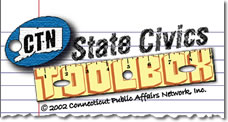TITLE: II. The Impeachment Process and Challenges in Connecticut
Vocabulary
- bill of attainder - a legislative act that singles out one or more persons and imposes punishment on them, without a trial.
- bi-partisan - supported by members of two parties, especially two major political parties.
- categorical immunity – not held responsible under any circumstances.
- compel – force someone to do something.
- disclosure – making something known that was previously unknown.
- due process – the administration of justice according to established rules and principles.
- Ethics Commission advisory opinion – a formal response from the Commission to persons who are subject to the Code of Ethics that ask how the Code applies to specific situations.
- executive session – when the public is excluded from the meeting of a public agency for purposes of discussing personnel matters, pending litigation, security issues, real estate deals or disclosure of public records.
- Freedom of Information Act (FOIA) - A law that requires the government to give out certain information to the public when it receives a written request
- hearsay – testimony given by a witness who relates not what he or she heard, saw, or knew personally, but what others have said.
- hearsay rules – hearsay testimony was allowed during the Select Committee of Inquiry hearings.
- impeach - to accuse a public official of a crime while in office.
- in camera – a hearing or inspection of documents that takes places in private.
- in limine – at the outset. (usage: Attorney Ross Garber requests permission to file a motion in limine prior to the calling of witnesses by the Select Committee of Inquiry.)
- inference - a logical judgment on the basis of circumstantial evidence and prior conclusions rather than on the basis of direct observation.
- jurisdiction – the power to exercise authority over persons and things within a territory.
- justiciable - issues and claims that can be properly examined in court.
- partisan – a member of a political party.
- quorum – the minimum number of members required to hold a meeting.
- Select Committee of Inquiry to Recommend Whether Sufficient Grounds Exist for the House of Representatives to Impeach Governor John Rowland – a group of ten Representatives assigned by the House in House Resolution 702. Committee is referred to throughout the unit as the Select Committee of Inquiry.
- separation of powers – the idea that government is most free and effective when the powers and functions of government are divided amongst separate, independent governmental institutions.
- Speaker of the House – Elected by the Majority party to preside over the session of the House. Sets the agenda for the party issues and controls which bills are debated on the floor.
- special counsel – a lawyer appointed for a particular purpose. (Attorney Steven Reich was appointed as Special Counsel for the Select Committee of Inquiry.)
- standing – the right or capacity to initiate a suit.
- State Ethics Commission – in Connecticut, a nine member panel created to administer and enforce the State's Codes of Ethics.
- stay – an order forbidding an action until an event occurs or the order is lifted.
- subpoena – an order requiring an individual to testify.
